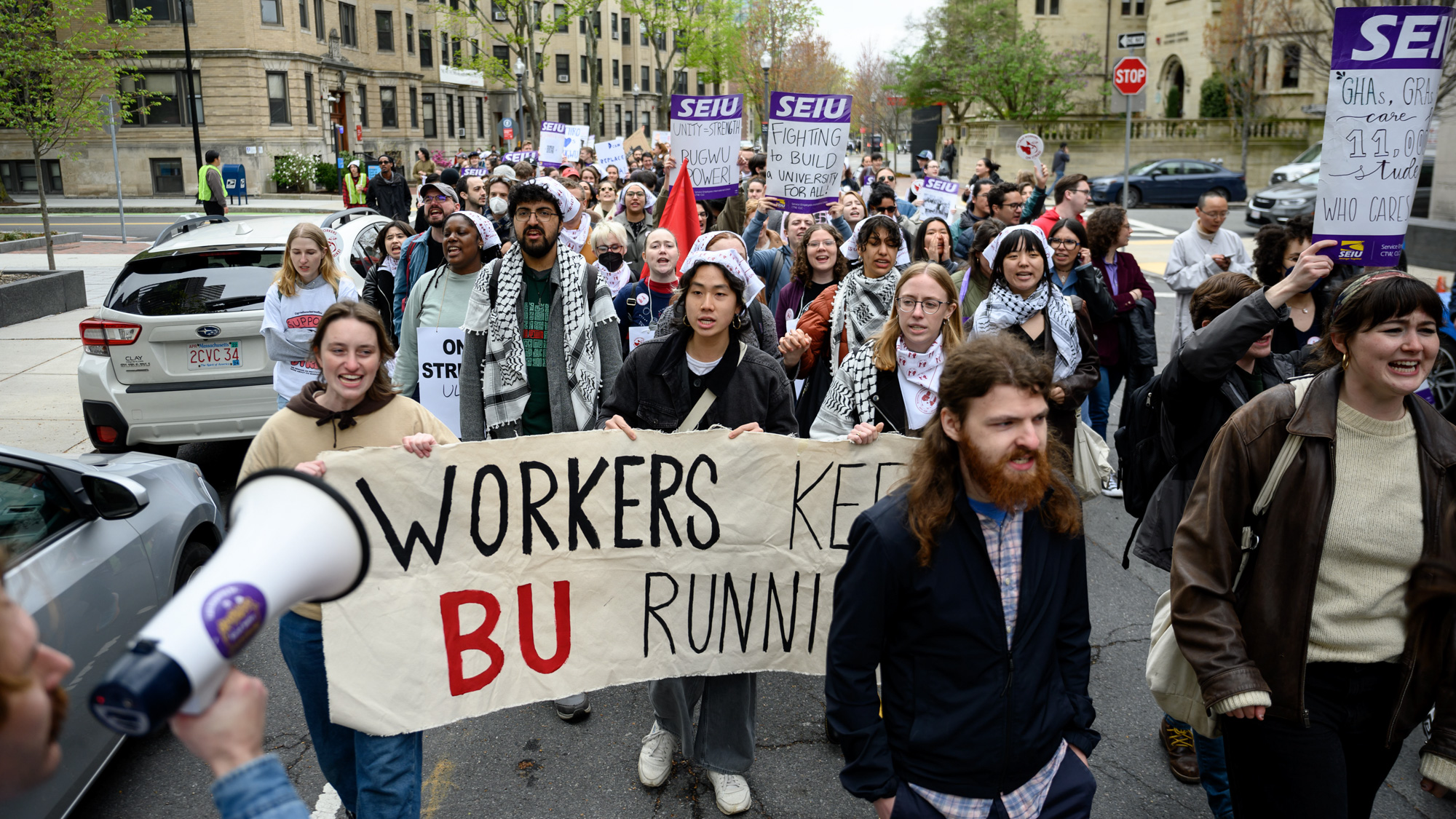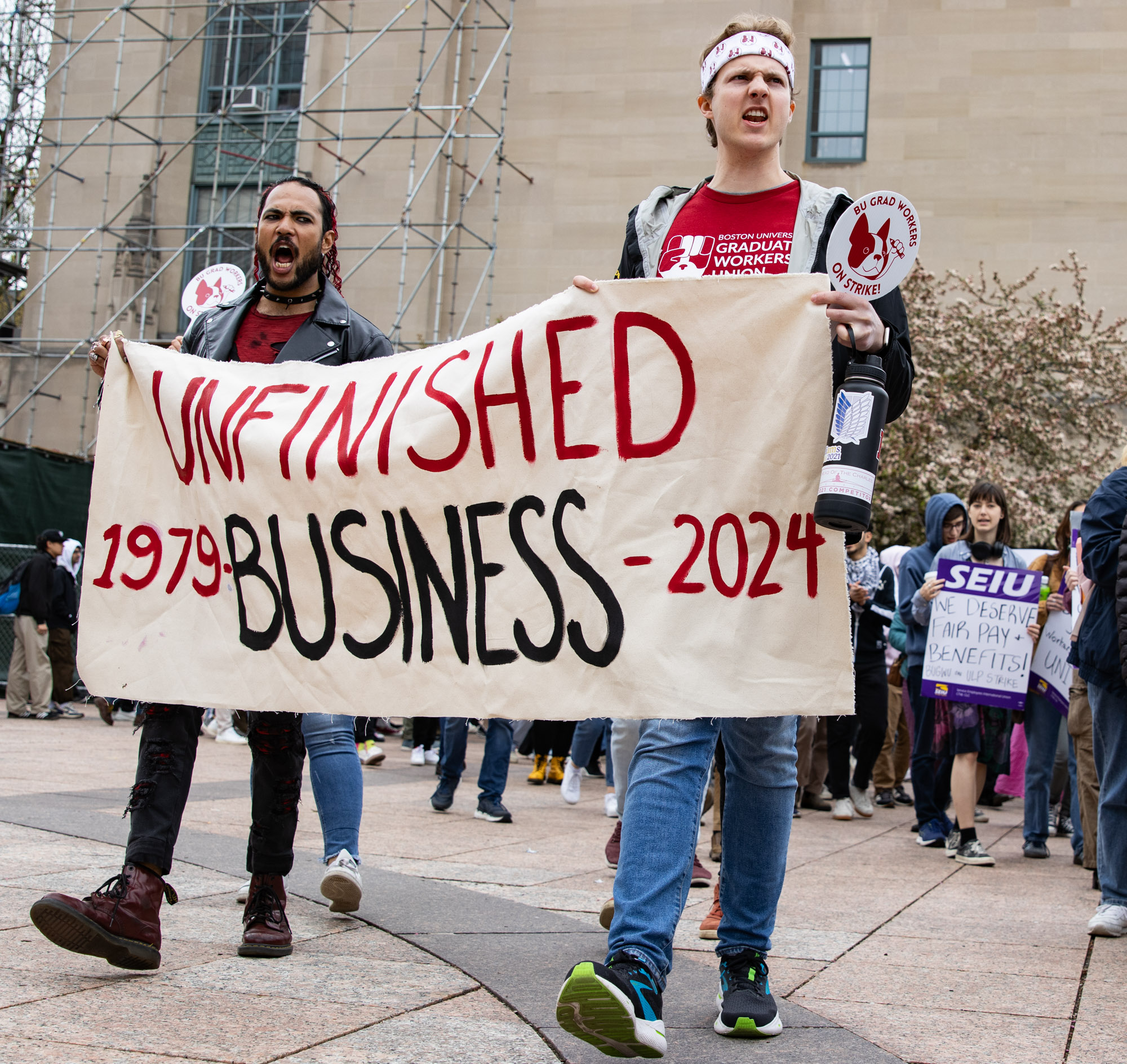The Boston University Graduate Workers Union held a walkout from Marsh Plaza to One Silber Way on Wednesday. This marks the union’s fifth week of striking.

The walkout was in response to an email sent on April 29 to the BU Community from the Office of the Provost regarding the strike, stating that 80% of BUGWU members have returned to work.
However, BUGWU posted on Instagram on April 24 that 94.9% of graduate workers voted in favor of continuing the strike into its fifth week.
The team bargaining on behalf of the University communicates directly with the Provost, and information sent out by the Provost comes directly from those reports, according to BU spokesperson Colin Riley.
“BU representatives are scheduled to meet with union representatives again tomorrow,” Riley wrote in an email today. “We’re hoping to continue progress toward an agreement.”
Hannah Howard, a member of the BUGWU bargaining team and a student pursuing a doctorate in sociocultural anthropology, said the walkout included faculty, staff and students to show that “they support us just as much as we support them.”
“The Provost emails have a lot of misinformation, but we’re mostly focused on our own mission and statement of securing a fair contract,” Howard said.
At the walkout, Student Body President Dhruv Kapadia reiterated the Student Government’s support of BUGWU. Kapadia said in a speech at the walkout, that he sent an email on April 12 in solidarity with BUGWU to all undergraduate students with “no hesitation.”
Kapadia said that BU administration withheld certain statements in the email sent on April 12 declaring Student Government’s support of the union. These statements involved BU’s call to use AI tools, withholding pay from graduate workers in an updated payroll system and attempting to reframe the narrative surrounding the negotiations.
“We do not pay $90,000 in tuition to have ChatGPT give us feedback on our work,” Kapadia said. “We do not attend a private university with a $3 billion endowment to have our [teaching fellows] and [teaching assistants] struggle to support their families.”
Kapadia said the BU administration aims to separate the BU community rather than bring them together.
“I would not be here without the labor, sacrifices and generosity of my graduate workers,” Kapadia said in the speech. “Grad students have been at the cornerstone of not only my academic success, but the academic success of all of my peers.”

In the most recent bargaining session with BUGWU last Thursday, BU tentatively agreed to six of the union’s proposals in one session, according to the Provost website.
However, according to Jaira Koh, a student pursuing a doctorate in the School of Theology, the six proposals are similar to the ones BUGWU first proposed months before the strike.
“Our strike is working because it’s revealing that the admin runs BU like it’s a real estate company that owns a diploma mill, giving out expensive degrees by any means necessary,” Koh said in a speech.
Koh said that the consequences students face from the strike are a result of the administration going “out of its way” to implement. He said it was important for undergraduates, faculty and staff to all show solidarity.
“We went on strike because we couldn’t live like this anymore,” Koh said. “But after six weeks of watching admins exploit our coworkers, our students, our mentors and punish all those who object, I don’t think it’s just grads that can’t tolerate life in the admin’s university anymore.”

Raul Fernandez, a senior lecturer in the Wheelock College of Education and Human Development, teaches a hub course with two graduate fellows who have not been in class because of the strike.
“I’m a strong supporter of our graduate student workers who do so much to keep this place running and also adds so much to what happens in our classrooms [and] research at the institution,” Fernandez said. “They just really matter and their wages and benefits need to reflect that.”
Fernandez hopes for a potential deal with the University between the graduate workers in the near future.
“What today is showing is that, in addition to graduate workers themselves, there’s strong support in student bodies, strong support from staff and strong support from faculty,” Fernandez said.























































































































Spencer Grant • May 3, 2024 at 5:45 pm
As a freelance photojournalist and BU grad — Journalism, ’66 — I covered both the employee and faculty BU strikes in 1979. I was thrilled to see such solidarity, with students joining in peacefully. Today’s grad student strike seems to have the same problem: being stonewalled by an administration. I’ve no idea whether BU’s current president is as bad as the fight-loving Jon Silber, who had one of his few defeats- albeit briefly- in the faculty strike but I wish you all well. Here in California last year the U of C grad students had UAW support and got some significant concessions. Hang in and best of luck! I wish I could enclose my photos of the UC Irvine strike.